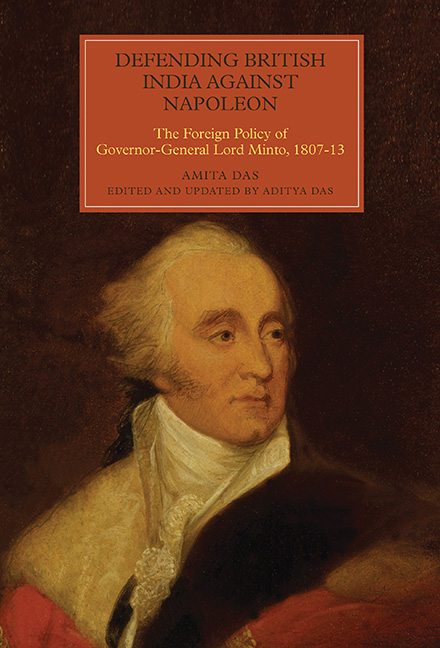Book contents
- Frontmatter
- Dedication
- Contents
- List of Illustrations
- Preface
- Abbreviations
- Chapter 1 Setting the Stage
- Chapter 2 Positioning in Persia
- Chapter 3 Creating a Buffer Zone
- Chapter 4 Protecting Trade and Supply Lines
- Chapter 5 Pre-empting French Influence in Java
- Chapter 6 Legacy of Lord Minto
- Appendix Government of the East India Company
- Bibliography
- Index
- Worlds of the East India Company
Chapter 6 - Legacy of Lord Minto
Published online by Cambridge University Press: 11 May 2021
- Frontmatter
- Dedication
- Contents
- List of Illustrations
- Preface
- Abbreviations
- Chapter 1 Setting the Stage
- Chapter 2 Positioning in Persia
- Chapter 3 Creating a Buffer Zone
- Chapter 4 Protecting Trade and Supply Lines
- Chapter 5 Pre-empting French Influence in Java
- Chapter 6 Legacy of Lord Minto
- Appendix Government of the East India Company
- Bibliography
- Index
- Worlds of the East India Company
Summary
End of an Era
No politician can make a situation. His skill consists in his well-playing the game dealt to him by fortune, and following the indications given him by nature, times, and circumstances.
These words, written by Burke to Minto during the years of their close association, could easily be regarded as Minto's guiding motto during his career in India. Minto left India with no regrets. During the six years he held office, he was conscious of performing the duties of his office rigorously, without sparing himself in any way. The three main factors that determined his foreign policy were the Napoleonic War, a broader conception of Indian defence, and the glimpse of a possible eastward expansion of British power from India, thus changing an emergency into an advantage. The European war greatly influenced the direction of his administration in India. The counteraction of Britain's European enemies in India, in the neighbouring states of Asia and in the Indian Ocean became the basis of his foreign policy. The foreign policy of the British Government in India was throughout its history closely related to Britain's relations with other European powers who also had interests in Asia. Minto's foreign policy was perceptively influenced by the exigencies of the European situation. The treaty of Tilsit (July 1807) left Britain in a critical state of isolation in Europe. This situation, coupled with the presence of the French in Turkey and Persia during 1807–09, caused gravest anxiety for the security of the British possessions in India, which amounted to a ‘Gallophobia’. The political missions to Persia, Afghanistan, Lahore and Sind originated from this feeling of insecurity. Minto's policy was to counteract the French threat as far away from the actual frontiers of the Company's territories as possible, and also to neutralise the intervening states between the Sutlej and Persia. The Spanish resistance in 1808 finally enabled the British to come to grips with the enemy in Europe. The improvement in the European situation, combined with Persia's coolness toward their French ally, caused a shifting of emphasis in Minto's foreign policy.
- Type
- Chapter
- Information
- Defending British India against NapoleonThe Foreign Policy of Governor-General Lord Minto, 1807-13, pp. 223 - 244Publisher: Boydell & BrewerPrint publication year: 2016

